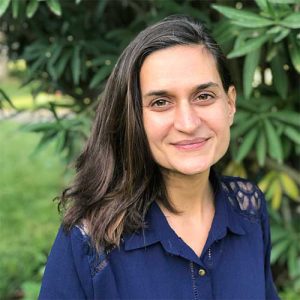To mark the publication of the Practical guide entitled “Des repères pour mettre en œuvre des projets innovants en santé numérique” (Benchmarks to implement innovative digital healthcare projects), produced as part of capitalisation generated by projects funded by the AFD Fisong (Facilitating sectoral innovation by NGOs) call for proposals on “ICT and Health”.
Anne Roos-Weil is health project manager with Agence française de développement (AFD), in charge of assessing and monitoring projects funded by AFD in the area of public health, mainly in Africa. She is also “digital lead” for the health and social protection division. Prior to joining AFD in 2017, Anne worked for 15 years in sustainable development, including 8 years as a senior management member of Djantoli, a pioneering association in the development of mobile applications for the prevention and screening of maternal and child illnesses that is recognised for its innovative intervention model.
In 2014, a Fisong call for projects entitled “Information and communication technologies (ICT) to improve access to maternal and child healthcare and family planning” marked a turning point in AFD’s approach to ICT… What was the reason for this new orientation?
Historically, AFD invested in the area of digital health mainly through hospital projects in the French overseas territories and in foreign States. These involved setting up hospital information systems for better management of the patient’s journey through the healthcare system. In Martinique for example, AFD funded the implementation of a clinical information system and an e-health services platform bringing together 15 public and private healthcare establishments.
But in 2014, conscious of the new opportunities provided in particular by the development of mobile telephony on the African continent, AFD chose to support innovation in this area by using new tools: by funding these digital innovations favouring maternal and child health via the Fisong call for proposals you mentioned, and by entering into a strategic partnership with Fondation Pierre Fabre, which launched its Observatory on e-health in developing countries to identify promising innovations in this area. AFD also supported the development of digital health projects by awarding prizes to “start-ups” as part of its annual AFD Digital Challenge competition. The last winner to date in the area of health is Yaoundé-based Cameroonian start-up AUI Techno, which developed a connected incubator to fight against neonatal mortality. Lastly, with its “Social Business” facility, AFD also supported the development of Kenyan start-up CarePay, which developed an electronic health portfolio called “m-Tiba”, making it possible to take out an insurance policy covering a significant network of accredited health centres and to pay for healthcare via mobile phone. Currently almost 3 million Kenyans subscribe to this service and benefit from quality healthcare in a network of 2,700 health organisations, which today extends to Tanzania and Nigeria.
AFD has just published a transversal capitalisation generated by three projects funded via this Fisong call for proposals (DataSanté in Mali, led by Santé Sud, Cellal e Kisal in Senegal, led by Amref, and MobiSan in Burkina Faso, led by GRET). What are the main lessons drawn by this capitalisation?
This capitalisation made it possible to define – beyond the specificities of each project – the common denominators of the three digital health projects, to discern questions raised by the projects that need to be answered, and to adopt best practices generated for future project leaders. These consist of simple, concrete advice. For example, with regards the time allocated to the design phase of digital solutions, which requires solid co-construction with future users in order to take their needs into account (for use and maintenance); or training actions that need to be well adapted to users’ requirements, some of whom have a low level of literacy and others of whom are not used to using tactile screens. Feedback from NGOs has also demonstrated the importance of entering into long-term partnerships with technological companies, and of managing to speak the same language.
Another lesson I learnt from this work concerns the time necessary for innovations of this type to be designed, tested, adopted, distributed and perhaps one day really “institutionalised”. This is a challenge, because a lot of donors invest either in phases highly upstream of testing, or in very large-scale deployment of innovations that have already been tried and tested. AFD is no exception to this rule…
Today, how does AFD envisage continuing its investment in the area of ICT and health?
While continuing to support the emergence, testing and development of innovative projects, AFD’s purpose is to work with States that wish to develop real national digital health strategies by capitalising on these innovations. This was the case in Tunisia, via funding of a technical cooperation programme that enabled the Ministry of Health to draw up a roadmap of strategic projects (digitisation of hospitals, e-medicine projects), implement appropriate national governance and develop an ecosystem of e-health stakeholders. This programme mobilised French partners such as CATEL, ASIP santé and ANAP. AFD is currently working in Morocco, supporting the authorities to define strategic priorities and prepare operationalisation of digital health programmes with a high impact on the improvement of access to healthcare and the patient’s journey through the healthcare system.
AFD can support these initiatives by mobilising the expertise of French stakeholders in particular (public agencies, NGOs, companies), and contributing to reflections on improving the efficiency of digital systems and their interoperability, as well as on the issues of digital identity and data protection.
Digital can be applied to healthcare systems in an infinite number of ways, and there is already significant proof from the field of the potential offered by these tools. The challenge now is to support better coordination of stakeholders around clear strategies and to strengthen national skills to manage these programmes. This is what AFD will do next November, by supporting a digital healthcare training seminar for senior civil servants from Ministries of Health in French-speaking African countries, organised in Cotonou, Benin, by the World Health Organisation and the International Telecommunication Organisation.






